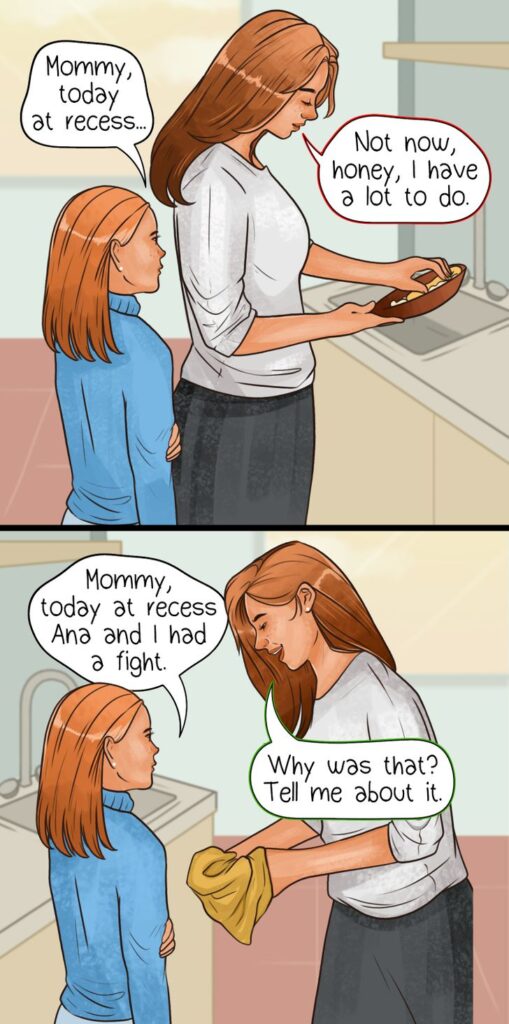All parents hope that in the future our children will be responsible, successful and happy adults. Childhood will be the perfect time to start taking care of them and giving them the tools they need so that they can finally achieve what they want.
By strengthening their self-esteem and helping them to trust themselves and manage their emotions, they will be ready when it is time to face the “grown-up world” with courage and determination.
We collected the most powerful positive reinforcement phrases that you can use with your children every day to help them develop excellent self-esteem.
Things All Kids Must Hear Their Parents Say
“You Can Count On Me” Or “I’m Here To Help You”

Whenever you see that your children doubt themselves or want to do something, but don’t seem to have the courage to do it, either because they don’t know how to do it or because they are afraid, remind them that you ‘are there for them.
Let them know that they can count on you and that they can count on your support and help if needed. Just knowing that you are on their side will encourage them to give it a try and they can be successful, even if you don’t need to help them.
That is why it is vitally important that children feel that they can trust their parents whenever they have a problem. This type of phrase, in addition to reinforcing the bond and trust between parents and children, will also give children a lot of security and confidence in themselves.
These phrases will help you avoid fear, knowing that if “something bad” happens, Mom and Dad will be there to protect or help you.
By learning and practicing these attitudes from childhood, their growth and development will be easier, especially later in life when they begin to deal with more serious situations.
“Tell Me” Or “i’m Listening”

This phrase is closely linked to the previous one, we cannot say “I’m here” if, later on, when they want to tell us something, we do not have time to listen. This sends a completely opposite message: “I’m not here”, “I don’t have time for you.” The moment your child wants to share something with you is the best time to show them that you are really there.
Stop what you are doing, it will only take a few minutes, but for your children, it will mean that you care and they can count on you. Listen carefully, don’t make fun of its story or underestimate its importance.
If they wanted to share it with you, it is because it is important to them. Don’t interrupt them. If you want to give feedback or add something, please wait until they are ready.
What you can do is show interest and enthusiasm for what they say: “Really?” “Wow”, “Amazing”, the kids love it. This is an ideal way to begin to establish good communication with your children and to build trust in yourself. So as they get older, they will want to continue to share their experiences and concerns with you.
“I Love You Very Much” Or Simply “i Love You”

We take care of them, look after them, we pay for their education, we organize their after-school classes, we buy everything they need and we don’t even lose an eye when we are worried about them.
All this and more simply because we love them and they are the most important thing in our lives. However, for a child, reaching this conclusion is not so easy. Therefore, experts recommend that, in addition to showing our love to our children through our actions, we also do it verbally.
These 2 phrases are extremely powerful – positive reinforcement with multiple benefits:
- It strengthens the bond between parents and children and improves family communication.
- It gives children confidence and peace of mind by feeling surrounded by love.
- It strengthens their self-esteem and helps them to love and accept themselves as they are.
- It allows them to grow happily, transmitting and providing this happiness to all around them.
- It strengthens their emotional intelligence and their relationship with their feelings.
- Children who feel loved are positive and optimistic.
- They show courtesy and respect for others.
So, whenever you can, take the opportunity to tell your children how much you love them between hugs and kisses.
“Do You Forgive Me?”

As imperfect human beings, we all make mistakes, including Mom and Dad. And what better way to teach our children to accept and take responsibility for their mistakes than by setting an example? When they see that we, their favorite superheroes, put our egos aside and ask for forgiveness, they will realize how important this is.
Often times, we not only fail to ask for forgiveness, but we force our children to do so. In such cases, we send children a very confusing message. Instead of fostering empathy for others, forcing them to do something they don’t want to do, they feel like we are victimizing them, causing them to focus on their personal discomfort rather than that of the actual victim.
So whenever you think you’ve made a mistake – raising your voice too loud, inflicting undeserved punishment, or being unfair to your children in some way – offer a sincere apology tailored to their age. Explain where you went wrong, how you feel about it, and what you learned from it so that your children can understand and apply it too.
“I Believe In You” Or “i Trust You”

When we are little, knowing that mom and dad trust and believe in us makes us feel, as if by magic, omnipotent because they know everything. And even if what we want to do doesn’t work the first time, continuing to trust your trust helps us not get frustrated and try again.
It’s not about lying to children and telling them all the time that we trust them to do whatever it takes, knowing that sometimes they really won’t be able to do it.
It may be because the task is not adapted to their age, they are not yet ready, or it is simply impossible (such as flying or moving objects with the mind, among other childhood fantasies). Our trust must be real and justified.
By trusting them, you will help them develop self-confidence. They will believe that they can (which is the first step towards being able), they will not give up easily, and they will look for alternatives and solutions that bring them closer to their goals because they are self-confident and confident that they will. achieve them.
Which of these phrases do you use the most with your children? How do you build your self-esteem?









Leave a Reply